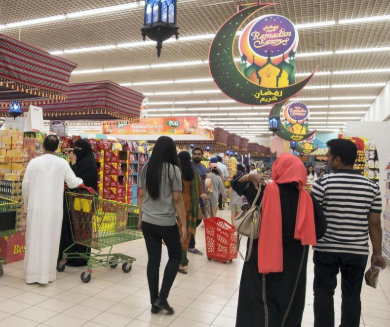 Consumers in UAE consider quality, freshness and hygiene as more important than low cost and convenience when shopping for groceries
Consumers in UAE consider quality, freshness and hygiene as more important than low cost and convenience when shopping for groceries
80% of respondents in UAE pay high attention to whether the fresh food is properly kept at safe temperatures during transportation and storage
A survey released by Emerson’s Commercial & Residential Solutions business shows that consumers have dramatically altered their shopping habits in response to COVID-19, putting pressure on retailers to adapt to changing consumption patterns. More than 8 out of 10 (81%) of respondents said they’re paying close attention to whether food is kept at safe temperatures all throughout the supply chain during transportation and storage. This strong focus underscores a critical need for retailers, supermarkets and suppliers to design and invest in technology, processes and cold chain infrastructure that help ensure freshness and safety of food to meet consumers’ expectations.
The Emerson survey, “Market Research Report: Cold Chain Consumer Survey during COVID-19,” has gathered responses from 604 male and female adults aged 20-60 in Australia, China, India, Indonesia, Philippines, Saudi Arabia, South Africa, South Korea, Thailand and the United Arab Emirates. According to the survey, consumers value food safety, hygienic shopping environment and quality refrigeration equipment more than lower prices compared to the time before the breakout of the COVID-19 pandemic. While 72% of respondents plan to return to more traditional fresh food venues like supermarkets, hypermarkets, wet markets and grocery stores once COVID-19 restrictions are removed, they will continue to expect the quality and freshness of food to be guaranteed. However, many consumers, including a majority of Indian and Chinese respondents, said they will continue buying fresh food from online platforms. From growers and processors to distributors and retailers, Emerson’s compressor brands and refrigeration technologies help protect perishable foods and cargo at every step along the cold chain.
More consumers are cooking and eating at home.
COVID-19 has changed where people eat their meals. Fewer people will be dining out as frequently as before, even when the restrictions have been eased. On average, 47% of respondents said they will choose to cook and eat at home even when the cities where they live reopen. Respondents in South Africa (84%), India (77%), Philippines (72%), Australia (61%) and Indonesia (60%) are more likely to eat at home than at restaurants.
As a result, more consumers will continue to buy fresh products from retailers. The change creates new opportunities for retail stores, supermarkets and online stores that plan to gain a better understanding of consumer preferences and address their concerns on food safety and quality through enhanced refrigeration technologies.
More Asian consumers are now shopping for groceries online.
Some of the major Asian markets continue to see a growing use of e-commerce channels for buying fresh food. China leads the way at 88% of respondents now ordering fresh food from online stores or through mobile applications, followed by South Korea (63%), India (61%) and Indonesia (60%). When it comes to fresh products, 52% of Indian respondents and 50% of Chinese respondents said they will continue to purchase the products online. With mass quantities of refrigerated and frozen food in inventory, large distribution centers experience the unique challenge of preventing food loss and protecting food safety on a grand scale. Adding to this complexity, many are also supporting e-commerce food retail fulfillment. Emerson provides distribution center operators with robust refrigeration systems, powerful controls, temperature monitoring, and a holistic view of facilities, assets and shipments to help ensure quality en route.
Supermarkets and wet markets have improved safety methods and standards since the beginning of the pandemic, but there is room for improvement.
A majority of survey respondents believe that supermarkets (82%) and wet markets (71%) have improved their methods and standards in ensuring food safety and quality. Consumers increasingly expect the food industry to comply with safety and health protocols (20%), maintain clean and hygienic stores (20%) and sell quality, hygienic and fresh food (15%). The change of consumer behavior will create significant markets for retailers who can use advanced end-to-end cold chain systems and the latest connected technologies to supply fresh and quality food and build trust in the long run.


